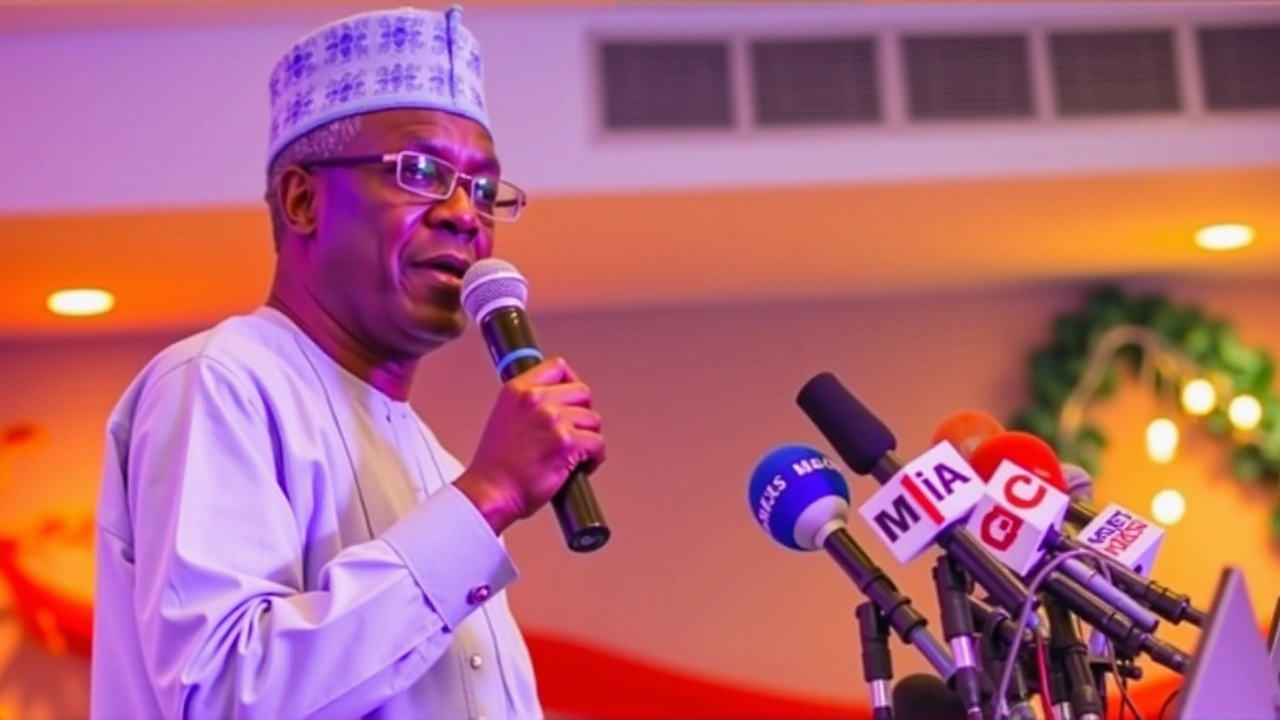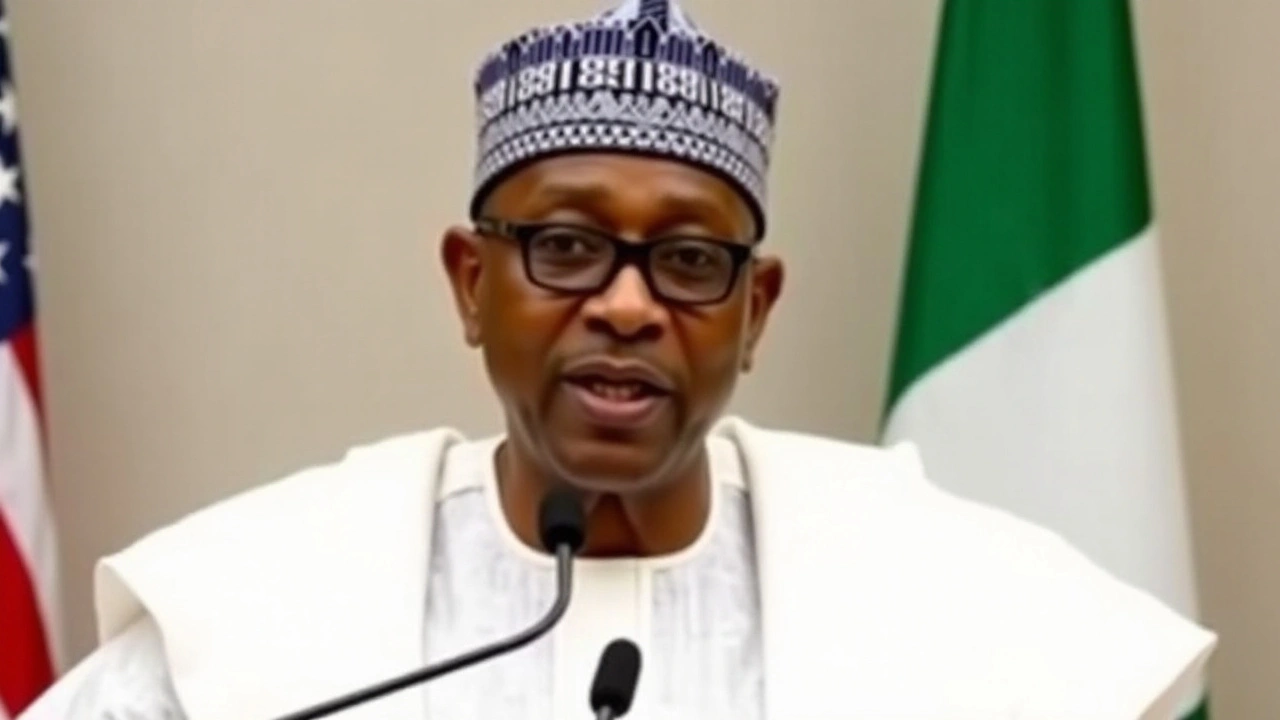Atiku Abubakar Raises Alarms Over NNPC's OVH Energy Deal
Former Vice President Atiku Abubakar has launched a vehement attack against the Nigerian National Petroleum Company (NNPC) Limited, accusing it of being manipulated by corporate cabals linked to President Bola Tinubu. His claims center around the NNPC’s acquisition of OVH Energy in October 2022, a move he believes is part of a broader scheme to merge Tinubu's personal business interests into federal enterprises. According to Atiku, this controversial deal has resulted in various irregularities that cannot be overlooked.
The OVH Acquisition: A Dubious Deal?
Atiku has vehemently argued that the NNPC's takeover of OVH Energy reeks of dubious intentions. The acquisition, according to him, saw NNPC Retail, previously owned by OVH Energy, shift ownership dynamics significantly. What raises eyebrows is his assertion that this deal allows Wale Tinubu's Oando to effectively own a 49% stake in NNPC Retail. This arrangement, he believes, is far from transparent and breaches ethical lines.
Furthermore, Atiku has accused President Tinubu of deliberately stalling NNPC's transition into a public liability company as dictated by the Petroleum Industry Act (PIA). This, he argues, is a deliberate ploy to prevent public scrutiny and maintain tight control over the company's operations. The implications of this, he suggests, are far-reaching and detrimental to Nigeria's economic landscape.
Concerns Over Legislative Investigation
The former Vice President has also expressed grave concerns about the credibility of a legislative investigation into NNPC's activities. His skepticism is particularly pronounced regarding the role of Senator Opeyemi Bamidele, who he suggests has close ties to President Tinubu. Atiku contends that Bamidele’s vested interests would likely hinder a thorough and impartial investigation, further clouding the transparency of the NNPC's operations.
Drawing parallels from Tinubu's previous maneuvers at the state level, Atiku warns that the integration of personal business interests into public enterprises seems to be a recurring theme. He cautions that this could mean the future of Nigerians is being 'mortgaged' to Tinubu and his close associates, a scenario detrimental to the nation's economic independence and integrity.
NNPC's Stance and Financial Success
The NNPC, however, has robustly refuted these allegations. In a detailed statement, the company emphasizes that the OVH acquisition was driven by commercial viability and national interest. NNPC clarifies that Wale Tinubu’s Oando had completely divested its equity in OVH as early as 2019, thus negating any claims of undue influence or involvement from him or President Tinubu in the acquisition.
Adding weight to its defense, NNPC points to its financial achievements under the current administration. The company’s 2023 Audited Financial Statement reveals a profit after tax of N3.3 trillion, underscoring its operational success and efficiency. This financial milestone, according to NNPC, is a testament to its commitment to transparency and national growth.
Broader Implications and Public Reaction
The discourse surrounding the NNPC and OVH deal has sparked varied reactions among the Nigerian public and stakeholders. On one hand, Atiku’s accusations have fueled concerns about potential manipulations within the country’s top petroleum company. On the other, NNPC's financial report presents a narrative of growth and progress, which some view as a counterargument to the claims of corruption and undue influence.
Political analysts suggest that this controversy could have significant implications for the governance and regulatory frameworks guiding Nigeria's oil and gas sector. The need for enhanced transparency and stricter adherence to legislated protocols and standards is becoming more pronounced. Observers argue that the unfolding events should be a clarion call for deeper reforms within the sector to safeguard national interests against personal or corporate exploitation.
Conclusion
Atiku Abubakar's allegations against the NNPC and President Bola Tinubu have opened a Pandora's box of questions and debates about the integrity of Nigeria's oil sector governance. While the NNPC has defended the OVH acquisition and highlighted its financial successes, the lingering doubts and calls for transparency continue to shadow its operations. For many Nigerians, the resolution of this controversy is not just about corporate governance but also about the broader fight for economic justice and national integrity.








Rahul kumar
August 23, 2024 AT 18:48 PMAtiku’s claim about the OVH deal touches on a pattern that has been observed since the previous administration.
The NNPC’s strategic acquisitions are generally guided by the Petroleum Industry Act’s provisions.
However, the 2022 purchase of OVH Energy coincided with a period of rapid policy shifts.
According to the 2023 audited financials the corporation posted a profit after tax of N3.3 trillion, which is a record for the sector.
That figure alone suggests that the operating model is delivering cash flow.
Analysts note that the profit surge was driven primarily by higher downstream margins and improved refinery utilisation.
The acquisition also gave NNPC control over OVH’s retail network, expanding its market reach.
Critics argue that any external shareholder influence should be disclosed under the Companies and Allied Matters Act.
In the case of Wale Tinubu’s Oando, the public record shows a divestment in 2019, well before the OVH transaction.
This timeline weakens the allegation of a hidden 49% stake.
Nevertheless, transparency mechanisms such as the Public Procurement Act still require full bidding documentation.
Civil society groups have called for a parliamentary committee to audit the deal’s procurement process.
If the committee gains access to the contract terms, it could verify whether market pricing was applied.
Moreover, the recent push to convert NNPC into a public liability company would subject its finances to greater scrutiny.
That conversion, once enacted, will also force the corporation to publish detailed annual reports.
In summary, while the profit numbers look impressive, a thorough independent review would settle lingering doubts about governance.
mary oconnell
August 25, 2024 AT 20:18 PMWow, another “groundbreaking” corporate shake‑up, because apparently the Nigerian oil sector has never seen a merger before.
The phrase “corporate cabal” really adds that extra layer of mystique you’ve been missing.
From a governance standpoint the NNPC’s move is as transparent as a foggy sunrise over Lagos.
Sure, the profit after tax number dazzles, but you can’t put a price tag on public trust, can you?
Michael Laffitte
August 27, 2024 AT 21:48 PMHold up, are we really supposed to believe that a profit of N3.3 trillion automatically wipes the slate clean?
It feels like watching a thriller where the hero wins the battle but the war is far from over.
The OVH deal might just be the opening act of a much larger drama playing out behind the scenes.
sahil jain
August 29, 2024 AT 23:18 PMHonestly, the whole “cabals” narrative sounds like a plotline straight out of a daytime soap 😏
But if you dig into the procurement docs you’ll see the process was vetted by the usual committees.
Bruce Moncrieff
September 1, 2024 AT 00:48 AMLook, the numbers are solid and the NNPC is showing real growth.
Don’t let the noise drown out the fact that the downstream margins are finally on the up‑trend.
We need to keep the momentum and push for more accountability without killing the engine.
Dee Boyd
September 3, 2024 AT 02:18 AMThe ethical implications of intertwining personal business interests with a state‑owned enterprise cannot be overstated.
When public assets become vehicles for private gain, the very foundation of fiduciary duty is compromised.
Stakeholders must demand rigorous compliance with anti‑conflict statutes to preserve institutional integrity.
Carol Wild
September 5, 2024 AT 03:48 AMIt is abundantly clear to anyone who has taken the time to trace the financial flows that the OVH acquisition was not merely a commercial transaction but a carefully orchestrated maneuver designed to embed private interests within the very core of Nigeria’s energy infrastructure; the timing of the deal, coinciding with the relaxation of certain regulatory safeguards, suggests a premeditated exploitation of loopholes that were deliberately left ajar by policymakers who are themselves entangled in a web of reciprocal favors; furthermore, the unprecedented profit surge reported in the 2023 audited statements should be viewed with a healthy dose of skepticism, as historically such spikes have often been the result of creative accounting practices that mask underlying inefficiencies and misallocation of resources; the involvement of high‑profile political figures, even if only peripherally, casts a long shadow over the legitimacy of the transaction, raising the specter of a shadow cabinet operating behind the scenes to steer corporate decisions in favor of a select few; one cannot ignore the pattern emerging from prior state‑level interventions where assets were systematically redirected to benefit associates, a pattern that now appears to be repeating itself on a national scale; this relentless march towards privatization under the guise of public interest is emblematic of a broader agenda to erode the public sector’s autonomy while fortifying a clandestine network of power brokers; as we dissect the layers of this deal, it becomes evident that the ostensible “commercial viability” narrative is but a veneer, thinly painted over a foundation of strategic patronage and covert influence; consequently, the call for an independent, perhaps even international, audit is not merely advisable but indispensable if any semblance of credibility is to be restored to the NNPC’s governance framework; finally, the silence from mainstream media outlets on these glaring issues serves only to highlight the extent to which information control has been weaponized to shape public perception in favor of the status quo.
Rahul Sharma
September 7, 2024 AT 05:18 AMIndeed, the evidence presented is compelling; however, it is essential to recognize that corporate acquisitions in emerging markets often involve complex stakeholder matrices, and while transparency is paramount, we must also consider the cultural context that influences negotiation practices; the NNPC’s strategic objectives align with national energy security goals, and the OVH integration could potentially enhance distribution efficiency, provided that robust oversight mechanisms are instituted and enforced.
Emily Kadanec
September 9, 2024 AT 06:48 AMJust so you know, the 2019 divestment by Oando was documented in the SEC filing, so the claim about a 49% stake doesn’t hold water.
william wijaya
September 11, 2024 AT 08:18 AMI hear you, and it’s frustrating when the numbers get twisted into a narrative that feels more like a drama than a policy discussion; the jargon about “public liability” and “financial stewardship” can obscure the real impact on everyday Nigerians who rely on affordable fuel.
Lemuel Belleza
September 13, 2024 AT 09:48 AMHonestly, this whole saga is just another political circus.
faye ambit
September 15, 2024 AT 11:18 AMWhile the theatrics may dominate headlines, it is the underlying principles of transparency and accountability that ultimately guide a nation’s progress.
Subhash Choudhary
September 17, 2024 AT 12:48 PMFrom a layperson’s view, it seems like there’s a lot of back‑and‑forth, but the bottom line is whether the fuel prices stay stable for the average consumer.
Ethan Smith
September 19, 2024 AT 14:18 PMData indicates that after the OVH acquisition, downstream margins improved by approximately 3.2 %, which correlates with a modest reduction in wholesale fuel prices, though the effect is mitigated by global oil price volatility.
Evelyn Monroig
September 21, 2024 AT 15:48 PMDon’t be fooled – this is a classic case of the ruling elite using state assets as a front to siphon wealth, and the media silence is a deliberate smokescreen to keep the public in the dark.
Gerald Hornsby
September 23, 2024 AT 17:18 PMPower plays, hidden agendas – the drama never ends 😎
Hina Tiwari
September 25, 2024 AT 18:48 PMIt’s easy to feel overwhelmed by the political tug‑of‑war, but remembering that real people’s livelihoods depend on these decisions can help us stay focused on what truly matters – a fair and reliable energy supply.